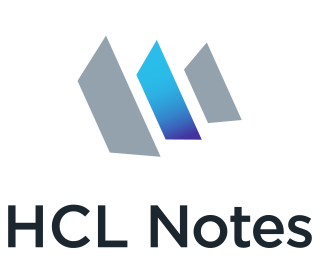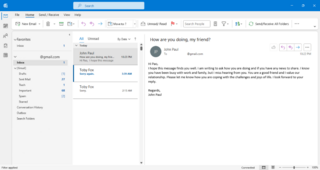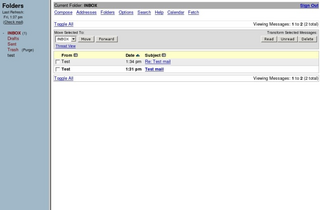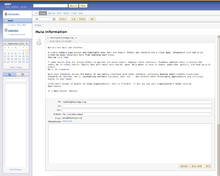
Mac OS X Server is a series of discontinued Unix-like server operating systems developed by Apple Inc. based on macOS. It provided server functionality and system administration tools, and tools to manage both macOS-based computers and iOS-based devices, network services such as a mail transfer agent, AFP and SMB servers, an LDAP server, and a domain name server, as well as server applications including a Web server, database, and calendar server.

HCL Notes is a proprietary collaborative software platform for Unix, Windows, Linux and macOS, sold by HCLTech. The client application is called Notes while the server component is branded HCL Domino.

GNOME Evolution is the official personal information manager for GNOME. It has been an official part of GNOME since Evolution 2.0 was included with the GNOME 2.8 release in September 2004. It combines e-mail, address book, calendar, task list and note-taking features. Its user interface and functionality is similar to Microsoft Outlook. Evolution is free software licensed under the terms of the GNU Lesser General Public License (LGPL).

Microsoft Outlook is a personal information manager software system from Microsoft, available as a part of the Microsoft 365 software suites. Though primarily being popular as an email client for businesses, Outlook also includes functions such as calendaring, task managing, contact managing, note-taking, journal logging, web browsing, and RSS news aggregation.

Mozilla Thunderbird is free and open-source email client software which also functions as a full personal information manager with a calendar and contactbook, as well as an RSS feed reader, chat client (IRC/XMPP/Matrix), and news client. Available cross-platform, it is operated by the Mozilla Foundation's subsidiary MZLA Technologies Corporation. Thunderbird is an independent, community-driven project that is managed and overseen by the Thunderbird Council, which is elected by the Thunderbird Community. The project strategy was originally modeled after that of Mozilla's Firefox web browser and is an interface built on top of that web browser.

NetWare is a discontinued computer network operating system developed by Novell, Inc. It initially used cooperative multitasking to run various services on a personal computer, using the IPX network protocol.

SOGo is an open source collaborative software (groupware) server with a focus on simplicity and scalability.
M+NetMail was an ISP-grade E-mail package by Messaging Architects. It was designed to deliver scalable messaging and calendaring services, using Internet-standard protocols, across a large enterprise, or to a large group of users who are not particularly associated. The original name for the product, when owned by Novell, was Novell Internet Messaging System (NIMS). Messaging Architects showcased NetMail on its MyRealBox website, this service was discontinued on June 1, 2011.

SquirrelMail is a project that aims to provide both a web-based email client and a proxy server for the IMAP protocol.

Mercury Mail Transport System is a standards-compliant mail server developed by David Harris, who also develops the Pegasus Mail client.
IBM Workplace is a discontinued a brand of collaborative software applications from IBM's Lotus Software division. It was intended to be the next generation of collaboration software that would work with IBM's Java EE-based WebSphere Portal server software. Introduced in 2003, the brand was largely disbanded by 2007, with its core technologies and many of its products rebranded as Lotus or WebSphere.

iFolder is an open-source application, developed by Novell, Inc., intended to allow cross-platform file sharing across computer networks.
Bynari is a defunct company based in Dallas, developing server and email software, mainly known for its Insight Family, similar to Microsoft Exchange Server with Outlook.
EGroupware is free open-source groupware software intended for businesses from small to enterprises. Its primary functions allow users to manage contacts, appointments, projects and to-do lists. The project releases its software under the terms of GNU General Public License (GPL).

Zarafa was an open-source groupware application that originated in the city of Delft in the Netherlands. The company that developed Zarafa, previously known as Connectux, is also called Zarafa. The Zarafa groupware provided email storage on the server side and offered its own Ajax-based mail client called WebAccess and a HTML5-based, WebApp. Advanced features were available in commercially supported versions. Zarafa has been superseded by Kopano.

Google Wave, later known as Apache Wave, is a discontinued software framework for real-time collaborative online editing. Originally developed by Google and announced on May 28, 2009, it was renamed to Apache Wave when the project was adopted by the Apache Software Foundation as an incubator project in 2010.
Exchange ActiveSync is a proprietary protocol designed for the synchronization of email, contacts, calendar, tasks, and notes from a messaging server to a smartphone or other mobile devices. The protocol also provides mobile device management and policy controls. The protocol is based on XML. The mobile device communicates over HTTP or HTTPS.

GroupWise is a messaging and collaboration platform from Micro Focus that supports email, calendaring, personal information management, instant messaging, and document management. The GroupWise platform consists of desktop client software, which is available for Windows,, and the server software, which is supported on Windows Server and Linux.











